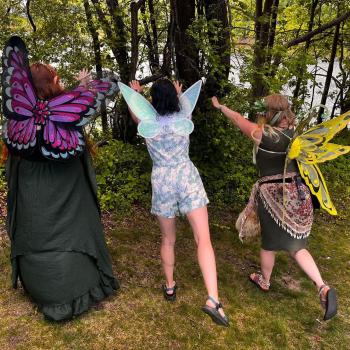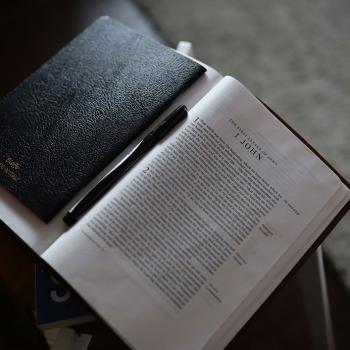Editors' Note: This article is part of the Patheos Public Square on Moving Past Hatred. Read other perspectives here.
My family, like many others, has witnessed hate first hand, both in speech and action. My mother was born in Germany just as Hitler rose to power. My father was born in Washington, D.C. and was a teenager when tens of thousands of hooded Ku Klux Klan members marched through its streets. I, too, was born in Washington, soon after World War II, and well remember how the local amusement park was open only to white children. I also remember responding to people's questions about my mother by saying vaguely that she was from "Europe" because I couldn't deal with Americans' hatred of all Germans so soon after the war.
Being accustomed to hate speech doesn't make it less painful, or less destructive.
Because of my job, I spend a lot of time on the internet following news coverage of social justice and religion stories. I grow nostalgic at times for the era when news was only covered in the print and broadcast media. Of course, there were painful stories about violence and injustice, but the difference was that the public's responses to the news coverage were usually limited to a handful of carefully selected letters-to-the-editor.
Today, however, comment sections immediately following news stories are filled with hateful rhetoric where nothing is out of bounds, which is also true for Twitter and other social media. To compound the problem, we live in the era of "trolls" (those who post inflammatory messages to incite others) and "clickbait" (provocative messages meant to attract attention). As a result, we are raising new generations of internet users who see hate-filled, incendiary rhetoric so often that it seems normal.
If hate speech were limited to the internet, that would be bad enough. It has, however, seeped into our day-to-day lives in other ways as well. Too many politicians and their supporters deliberately resort to inflammatory rhetoric to attract attention and raise their standings in the polls. When those politicians prevail in elections, they have already angered and divided the citizenry to such a degree that it becomes impossible to unite their communities or the nation as a whole.
There is no question that violence and divisions are rooted in hate and fear, with perhaps the worst examples being those that stem from hateful misinterpretation of religious teachings. Those who attack others and sow hate "in the name of God" don't know God at all.
In today's pain-filled world, I am deeply grateful for the presence of Pope Francis, who actively seeks to bridge divides that cause so much suffering. We need him.
From the beginning, he has challenged everyone across the ideological and political spectrums to see all people as one family living in a common home. His approach is deeply pastoral, caring for all members of that family, not just those who agree with him about certain issues. And his joyful spirit is a soothing balm.
His pastoral approach was clearly evident during his recent trip to the U.S. He came not to scold; instead he sought to bring people together, reaching out to and embracing all the people he met. He repeated in many contexts his wish to enter into dialogue with diverse groups and individuals. Through his words, smiles, and actions, Pope Francis showed that he does not only talk about caring for the whole human family, he lives it. The enthusiastic response he received wherever he went was proof of our national hunger for his message of inclusion.
As a Catholic, I speak from a Catholic perspective, but I do not wish to imply that our Catholic pope is the only person of faith who seeks to overcome hate with love. One of the most moving events during his U.S. visit was his participation in the interfaith ceremony for peace and tolerance at the National September 11 Memorial in New York.
Creating hope for a peaceful tomorrow, he said at the memorial: "It is a source of great hope that in this place of sorrow and remembrance I can join with leaders representing the many religious traditions which enrich the life of this great city. I trust that our presence together will be a powerful sign of our shared desire to be a force for reconciliation, peace and justice in this community and throughout the world."
Pope Francis and many other people of faith exemplify today what Dr. Martin Luther King said years ago: "Darkness cannot drive out darkness: only light can do that. Hate cannot drive out hate: only love can do that."
May we all move forward with that same understanding.
10/13/2015 4:00:00 AM




